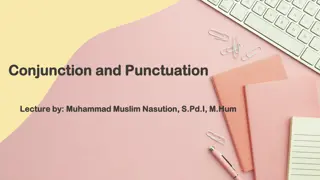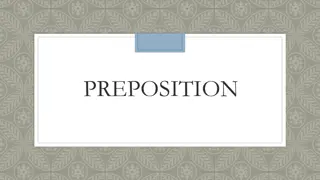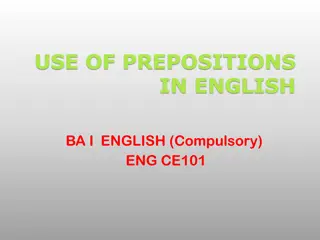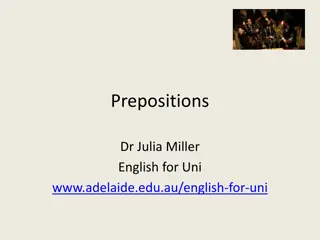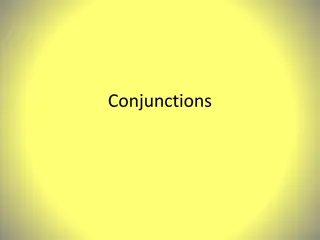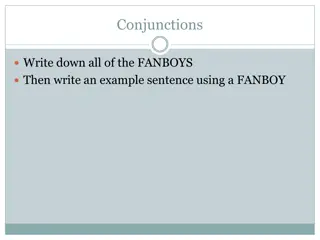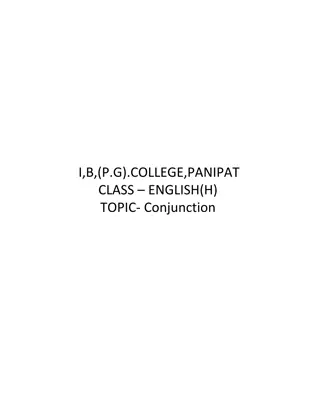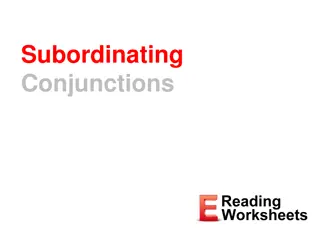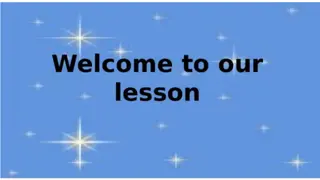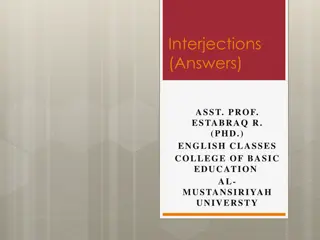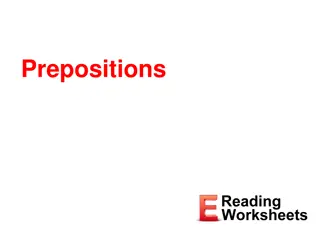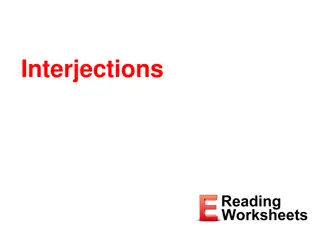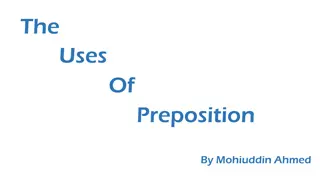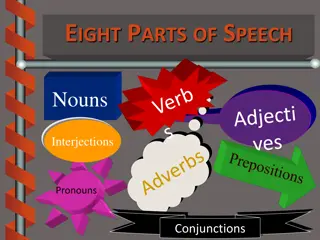Understanding Prepositions, Conjunctions, and Interjections
Explore the role of prepositions in indicating relationships between words, learn about different types of conjunctions, and understand how interjections express strong emotions in language. Discover the various examples and usage of prepositions, conjunctions, and interjections through detailed explanations and visual aids.
Download Presentation

Please find below an Image/Link to download the presentation.
The content on the website is provided AS IS for your information and personal use only. It may not be sold, licensed, or shared on other websites without obtaining consent from the author. Download presentation by click this link. If you encounter any issues during the download, it is possible that the publisher has removed the file from their server.
E N D
Presentation Transcript
Parts of Speech Prepositions, Conjunctions, and Interjections
Prepositions Prepositions make it possible to show relationship between words. A preposition relates the noun or pronoun that appears with it to another word in the sentence. Notice how the prepositions below relate to the other words. Inventions are made around the world. Some inventions last for centuries. Tina is late because of the train. A prepositional phrase is a group of words that includes a preposition and a noun or pronoun.
PREPOSITIONS Aboard About Above According to Across Across from After Against Ahead of Along Alongside Along with Amid Among Apart from Around Before Behind Below Beneath Beside Besides Between Beyond But By By means of Concerning Considering Despite Except During In front of In place of In regard to Inside In spite of Instead of Into In view of Like Near Nearby Next to Of Off Onto On account of Over Owing to Past Prior to Regarding Round Since Through Throughout Till To Together with Toward Under Unto Until
PREPOSITIONS Aside from As of As Atop Barring Because of Except For From In In addition to In back of Onto On top of Opposite Out Out of Outside Unto Up Upon With Within Without Preposition or adverb? Many words may be used either as prepositions or adverbs. Words that can function in either role include around, before, behind, down, in, off, on, out, over, and up. If an object accompanies the word, the word is used as a preposition. Preposition: The Machine Age developed around a group of inventions. Adverb: My thoughts went around and around.
A conjunction is a word used to connect other words or groups of words. Coordinating Conjunctions: The seven coordinating conjunctions are used to connect similar parts of speech or groups of words of equal grammatical weight. COORDINGATING CONJUNCTIONS But For Nor And Or So Yet Correlative Conjunctions: The five paired correlative conjunctions join elements of equal grammatical weight. CORRELATIVE CONJUNCTIONS Both and Not only but also Either or Neither nor Whether or
Subordinating Conjunctions: Subordinating conjunctions join two complete ideas by making one of the ideas subordinate to, or dependent upon, the other. SUBORDINATING CONJUNCTIONS Because Before Even if Even though How It Inasmuch as In order that After Although As As if As long as As much as As soon as As though Lest Now that Provided Since So that Than That Though Till Unless Until When Whenever Where Wherever While Examples: We protect the wetlands because they are important to the ecosystem. As soon as the volunteers arrived, the cleanup work began.
Conjunctive Adverbs: Conjunctive adverbs act as transitions between complete ideas by indicating comparisons, contrasts, results, and other relationships. The below lists the most common conjunctive adverbs. Conunctive Adverbs Finally Furthermore However Indeed Moreover Accordingly Again Also Besides Consequently Nevertheless Otherwise Then Therefore Thus Punctuation with Conjunctive Adverbs: Punctuation is usually required both before and after conjunctive adverbs. Examples: The team was very successful. Nevertheless, they continued to practice very hard. Sophia plays several instruments well; however, her favorite is the piano. I arrived late; futhermore, I forgot my books.
Interjections Interjections express emotion. Unlike most words, they have no grammatical connection to other words in a sentence. An interjection is a word that expresses feeling or emotion and functions independently of a sentence. SOME COMMON INTERJECTIONS Dear Hey Goodness Hurray Gracious Oh Ah Aha Alas Ouch Psst Tsk Well Whew wow



